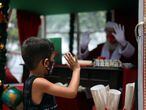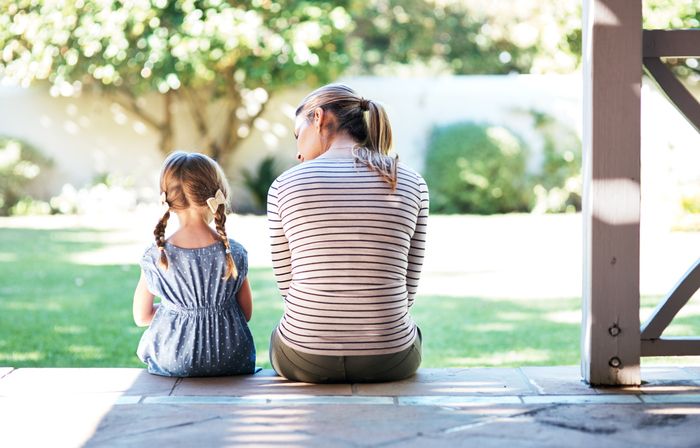The sad news of the discovery of the lifeless body of Clara, the 10-year-old girl, in the San Juan reservoir (Madrid), after days of searching, has turned inside thousands of parents who can come to understand how they have to feel your parents right now.
"The death of a loved one is a very hard and difficult moment in our lives," he explains.
Pedro M. Paulino Matos, psychiatrist
.
“
We can be prepared for the death of a grandfather, a father, a mother, but not in this way to face and assume the death of a child.
This situation breaks our schemes, our life plans and causes great physical and emotional stress that we cannot get away from.
Our stomach knots, we get angry with everything, our thoughts become blocked, ideas of death, misunderstanding, frustration and helplessness come to us.
And, in many cases, guilt appears, aggravated if we feel responsible for it ”, adds the expert.
More information
How to tell a child that a loved one has died
Taking advantage of the pandemic to break the taboo of death with children
All of this is a major emotional shock. For this reason, “it is essential that parents are accompanied by close people from the outset, even seeking professional help and support to begin the process of coping and grieving. The appropriate professionals are psychiatrists and psychologists. Pharmacology is important, but therapy is also important, sometimes even more important ”, Paulino Matos emphasizes.
The circumstances in which death occurs inevitably influence the initial response and evolution of the process: “It is not the same that death is due to a medical or oncological disease that is accidental, due to a motorcycle accident, drowning, or if it has disappeared and the body has not been found (case of Marta del Castillo).
In these cases it is practically impossible to begin to develop a proper duel ”, continues the psychiatrist.
Understand grief
“Grief is a psychological process that occurs after an absence, loss, abandonment or death. Although it goes through several phases (denial, anger, negotiation, fear or depression, acceptance, reestablishment), it is different in each person, we cannot relativize it and one must be realistic. The death of a child is not forgotten, but we end up incorporating and integrating it into our daily life ”, continues the expert. As he maintains, it is a very complex, difficult situation that we must, in one way or another, assume and try to live with it with the greatest possible dignity: “Each one needs their time and each person sets their own pace. I do consider it essential that parents from the first moment do not isolate themselves, do not shut themselves up and, as far as possible, progressively rejoin their routines, activities and social life.We must also not neglect how this can negatively affect the relationship of the couple and the siblings or other close relatives. They are those moments in which both parents should come together, ask for help and do couples therapy if necessary, in order to better develop the grieving process together ”.
Sometimes, the initial psychological impact is so powerful, the emotional block so great that it creates a lot of helplessness, irritability, frustration, emotional instability that can be disabling and limiting when it comes to coping with the day to day: "In these cases, You may benefit from drug treatment so that together with psychological therapy you can better address the symptoms and the situation. Not everyone needs medication and each case must be analyzed individually and by specialist professionals. Medication is a resource, a pillar on which we can establish the basis for treatment. It is not the only one, other aspects are those related to sleep, physical exercise, occupation and leisure activities, social activities, food, and psychotherapy. Each thing in its proper measure,adapted to the characteristics and personal situation of the mother, father… ”.
“It is fundamental”, continues Paulino Matos, “to be able to remember the experiences and our son with love, integrate him into our interior, accept his absence with all the pain in the world and in our hearts.
Give life a chance, give ourselves a chance to embrace life.
And if we need professional help, don't deny us it ”.
Psychological therapy is essential
The word "mourning" comes from Latin and means "pain" and the word "trauma" has its origin in Greek and means "wound".
The loss of a loved one unites these two concepts, a wound that leaves us with enormous pain, which nevertheless we must fit in and move on with our lives.
Manuel Hernández, psychologist and author of the books
"Attachment and psychopathology", Why do the people I love hurt me "and" Attachment, dissociation and trauma
"? and president of the Spanish Association of Psychological Trauma (AETPS) explains that “each person overcomes a duel as best they can, there is no correct way to face it, there are those who prefer to keep all the memories of the person who has left and other people do not want to have any belongings that can remind that person who is no longer there ”. “Often,” he continues, “in bereavement, men focus more on their work and women seek emotional support from either friends, family, or therapists. Other times people prefer not to talk about the loss while others cannot stop remembering it, talking about it as if it would bring it back to life for a while "
"There is no correct way to elaborate a duel", Martinez emphasizes.
“All therapeutic work consists of helping the person to work it according to their needs, their values or their beliefs.
Understanding the meaning that the person gives to that loss is essential to be able to help them to give an adaptive meaning to what has happened.
Grief must be adapted to what the person needs in order to fit that experience into their autobiographical memory or experience ”, he explains.
We must take into account, as he maintains, that there are several factors in losses that greatly influence the way in which grief is lived, although there are always two emotions that always accompany it: guilt and anger:
A loss due to a natural cause such as an illness is not the same as if it has been caused by the negligence or violence of another person.
If the loss has been caused by one of the parents by a mistake, a precipitation, an accident, the guilt and anger will be much greater.
One will probably blame the other for what has happened and the other will not be able to stop blaming himself.
In the case of suicides, unfortunately increasingly frequent in young people, the feelings of guilt in the parents for not having realized it before and of anger for not having been able to prevent it, will be greatly enhanced.
Therefore, overcoming the loss of a loved one, especially a child, is a very personal process that will depend on the circumstances of each person.
However, some general guidelines can be followed to help you live with that loss.
Being able to accept that the person is gone, often guilt is a way of being able to feel that somehow they are still with us, but it does not help more than to hinder the healing process.
Do not try to forget the person, he is someone who will always be with us and we have to learn to live with all the good that we have shared, and not with what we had left to live.
Be respectful of the deadlines and needs of each person.
A grief can be delayed, but it cannot be avoided, and you have to be aware of the needs of each person to keep up and in the way that the person can tolerate.
Try that the grief can be overcome by the whole family, not leaving anyone behind in the process, since it will make it even more difficult to overcome what has happened.
Doing therapy or seeking support groups can make the grief less intense and shorter, and therefore save suffering for parents, siblings, and all those directly and indirectly involved in the loss.
Not only adults suffer losses, so do children, who in this case can be siblings, cousins, friends, etc.
they also need to give meaning to that loss and need special help.
No matter how old those who stay they also need to work through and overcome the loss.
Unfortunately, in these cases, children not only lose their brother, but they can also symbolically lose their parents who will be immersed in their own pain process.
You can follow De mamas & de papas on
,
or sign up here to receive
our weekly newsletter
.









